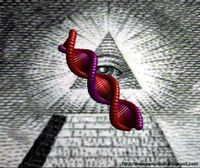Identifying the Coalition of the willing.
I was asked an obvious question a couple of days ago which went like this.
"How does biometric identification reduce terrorism?"
It's a good question and one that opens up a can of worms.
Christian Kerr has an article at Crikey as the Real ID and biometric aspects hit the third country involved in the "coalition of the willing" for our own good.
Apparently, just like the US and the UK who we followed down the garden path in the search of WMD's we suddenly find ourselves in the position of having the prospect of having our biological details on a database, which matches a card which somehow should stop the terrorists slipping through the net.
I fail to see the logic of this argument.
Christian Kerr at Crikey has this to say.
The national ID card debate
By Christian Kerr
Would you trust these people with an ID card?
Disgraced Immigration Minister Amanda Vanstone told Laurie Oakes yesterday a new minister would not necessarily get better results in the portfolio. “I don't know that a new minister would do better, frankly,” she said. How much more contemptuous can you get?
The Palmer Report showed disgraceful lapses of public administration in Vanstone's department – and in Queensland, too. Yet Peter Beattie restarted the debate over a national ID card last week (here). Vanstone backed it on Sunday.
They want us to trust them with such a scheme?
The prime minister – a leading opponent of the Hawke Government's Australia Card concept in the eighties – kept his options open over the weekend: “It's a balance any democratic society requires – a constant readjustment of that balance,” he said. “If you look at it just as a civil liberties issue you would never change anything. If you just looked at it as a protection against terrorism issue, you would authorise many changes that people would regard as unacceptable.”
He's in Washington today. ID cards will become an even bigger issue when he visits Britain later in the week, where such a scheme has been a hot issue since 9/11.
Michelle Grattan observed yesterday that a London School of Economics report found Blair's actual proposals were not feasible: they were too complex, technically unsafe, overly prescriptive and lacked a foundation of public trust and confidence. What she didn't say is that it will be a user pays card. British residents will pay for one – and the costs keep rising. The LSE estimates the project will cost 19 billion pounds – $700 per person.
Chris Puplick, a member of the parliamentary committee that examined the Australia Card concept, writes in The Australian today: “The benefits of national ID cards are grossly overstated and their potential negative impacts on our freedom and way of life remain unacceptable.”
He leaves out one compelling argument. What were the London terrorists carrying along with bombs? ID.
Exactly. Which goes back to the original question asked "How does biometric ID reduce terrorism?"
I can't recall the source but there was a piece about how the more technological advanced identification such as holograms and biometrics would actually be highly prized rather than be a deterrent by those with less than honourable intentions. And yes these can be forged.
Adam Shostack goes into other matter biometric and privacy vs safety matters rather well. He mentions and points to articles. How these things can be forged. He descibes databases that are hacked into, lost or missing. he points us in places where ID has been sold by those working in government.
A google search using "real ID" "doesn't work" also shows a large anmount of material on the matter such as this. from alternet.
" It doesn't really matter how well an ID card works when used by the
hundreds of millions of honest people that would carry it. What matters is
how the system might fail when used by someone intent on subverting that
system: how it fails naturally, how it can be made to fail, and how failures
might be exploited.
The first problem is the card itself. No matter how unforgeable we make it,
it will be forged. And even worse, people will get legitimate cards in
fraudulent names.
Two of the 9/11 terrorists had valid Virginia driver's licenses in fake
names. And even if we could guarantee that everyone who issued national ID
cards couldn't be bribed, initial cardholder identity would be determined by
other identity documents ... all of which would be easier to forge.
Not that there would ever be such thing as a single ID card. Currently about
20 percent of all identity documents are lost per year. An entirely separate
security system would have to be developed for people who lost their card, a
system that itself is capable of abuse.
Additionally, any ID system involves people ... people who regularly make
mistakes. We all have stories of bartenders falling for obviously fake IDs,
or sloppy ID checks at airports and government buildings. It's not simply a
matter of training; checking IDs is a mind-numbingly boring task, one that
is guaranteed to have failures. Biometrics such as thumbprints show some
promise here, but bring with them their own set of exploitable failure
modes.
But the main problem with any ID system is that it requires the existence of
a database. In this case it would have to be an immense database of private
and sensitive information on every American -- one widely and
instantaneously accessible from airline check-in stations, police cars,
schools, and so on."
I am assuming this "using biometric to catch terrorists" is just a front. As John D. Woodward, Jr. "Lawyer, Senior Policy Analyst, RAND and former CIA Operations Officer" (guess what his angle is going to be?) say in his paper "FACIAL RECOGNITION, RETINAL IRIS SCANS, DNA, FINGERPRINTING, BRAIN PRINTING, EAR MATCHING, SMART CARDS . . . WHAT'S NEXT?".
Even if September 11 never had happened, law enforcement uses were just around the corner. Support for these systems was starting to grow before the terrorists struck. There were already biometric programs up and running throughout the United States' criminal justice and correctional systems. The only difference now is that the public is beginning to embrace biometric uses on a much greater scale. The horrors of September 11 appear to cause the public to be willing to sacrifice a little of its precious privacy for the sake of feeling greater personal security.
I would change "a little of its precious pricacy" to a LOT.



1 Comments:
Privacy is a privilege, not a right. I can see that phrase being used, bald-faced, and accepted, willy-nilly, in the future. And a whole whack of people will buy into it. The table has been set already. It's all for our own good, for our own protection. The baldfaced and the willy-nilly. It's far too early. I need coffee.
By Anonymous, at 8:43 pm
Anonymous, at 8:43 pm
Post a Comment
<< Home